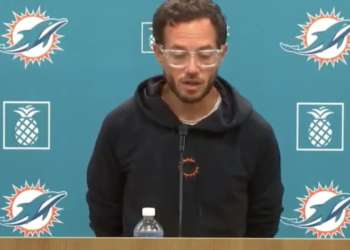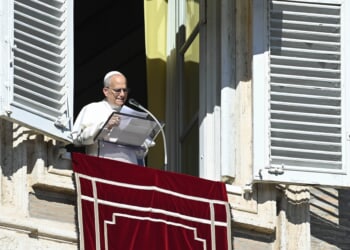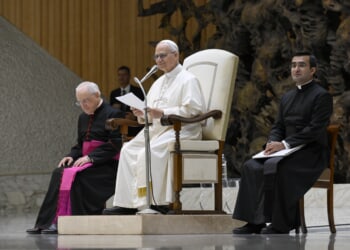LAS VEGAS — “From this day forward, it’ll be a policy of the United States to do whatever it takes to lead the world in artificial intelligence,” President Donald J. Trump told a technology summit in Washington, D.C. on July 23. Back in 2018, Trump 45 declared on Dec. 4, 2018: “My Administration will do everything possible to provide our children, especially kids in underserved areas, with access to high-quality education in science, technology, engineering, and math” (STEM).
Gil Hyatt has a promising idea to help Trump fulfill last summer’s commitment and the one he made seven years ago.
So, who is Gil Hyatt?
Despite his surname, and unlike Governor JB Pritzker (D-Illinois), he is not an heir to the Hyatt Hotels empire. Gilbert Peter Hyatt is the son of legal immigrants from Ukraine and the Austro-Hungarian Empire.
And don’t let his Sin City address fool you. Hyatt’s low-key vibe mocks the flash and sizzle of the Las Vegas Strip. The unassuming 87-year-old speaks quietly, dresses modestly, and drives a 33-year-old automobile. Although he can afford something newer and more stylish, he told me in an exclusive interview, “I have a 1992 Celica stick shift. Beautiful little car.” He is perfectly at ease with this choice. “I don’t want a new car. I like my Celica.”
Hyatt’s demeanor veils a lifetime of momentous scientific achievement and path-breaking innovation. Hyatt earned a baccalaureate in electrical engineering at UC Berkeley and his master’s degree in that field from USC. He soon fine-tuned guidance systems at Boeing, honed inertial navigation at Hughes Aircraft, and boosted NASA’s Apollo program at North American Aviation.
While Gil Hyatt is not a household name, his inventions have filled American homes and offices since the 1970s. Many goods were produced under licenses to Hyatt’s patents, including early Canon and Nikon digital cameras, Panasonic TVs, Sharp’s calculators and liquid-crystal displays, and Sony’s PlayStation. All told, Hyatt has held more than 70 patents. The crown jewel is U.S. Patent No. 4,942,516, for the computer microprocessor — essentially the steam engine of the digital age.
Hyatt was an early innovator in something that seems to seize every billboard, headline, and new-product launch today: Artificial Intelligence.
Hyatt was an early innovator in something that seems to seize every billboard, headline, and new-product launch today: Artificial Intelligence. His patent pending on AI technology dates to 1984. That January, Apple stunned the world with a Super Bowl TV ad directed by Ridley Scott.
Inside a cold, gray room, scores of nearly identical, male (political?) prisoners stare like robots at a huge black-and-white screen on which a Big Brother type spouts propaganda. A female track-and-field athlete, chased by high-tech stormtroopers, races to the front of the room, hurls a sledgehammer into the screen, and shatters Big Brother’s grip on his inmates. An announcer says, “On January 24th, Apple Computer will introduce Macintosh. And you’ll see why 1984 will not be like 1984.”
Consider all that has unfolded in AI over the ensuing decades. Hyatt said his pending patent applies to products crafted in foreign factories via AI processes that he invented.
Hyatt is waiting for the U.S. Patent and Trademark Office (USPTO) to issue him a full, non-pending patent to protect his AI-related intellectual property. Forty-one years of AI developments — from AI-infused manufacturing procedures to finished products — would fall under Hyatt’s patent. If AI suppliers wanted to import into America, they would have to obey this patent’s requirements. These could range from nothing at all to human rights and fair-trade practices, to patent royalties. The International Trade Commission could exclude unlicensed or otherwise non-compliant products from entering America.
Hyatt could take a “pay the piper” approach and pocket millions or even billions in patent-related income. However, he does not crave a dollar from this AI patent nor others that might follow.
Hyatt pictures something completely different: He aspires to establish the Pioneering AI Foundation as a public-private partnership akin to the Smithsonian Institution.
Hyatt imagines this non-profit being supervised by a blend of presidential appointees and civil-society luminaries. The PAI Foundation would be funded by revenue generated by Hyatt’s intellectual property.
“I’m not even going to draw a salary from the Foundation,” he told me over lunch at the Tuscany Resort on Flamingo Road, a 10-minute stroll from the faux-ancient charms of Caesars Palace and the dancing waters of The Bellagio. “I will assign these patents to the Foundation, for philanthropic purposes and to help the Trump Administration with its trade policies.”
Hyatt cannot wait to donate his AI patents to the PAI Foundation and, thus, enrich and empower it to pursue four goals:
First, the Foundation would offer Hyatt’s patents to Trump and future presidents to use as incredibly and increasingly valuable bargaining chips in trade negotiations with foreign economic powers, starting with China.
Beijing’s national Ministry of Industry and Information Technology reports that “China has built over 30,000 basic-level smart factories,” as China Daily summarized it. Many or most use AI or eventually will. When they do, they will be subject to Hyatt’s patents. If they wish to compete in the U.S. market, Hyatt wants to equip Trump and future presidents to decide if China’s AI-flavored offerings may come to America, how, and at what price — in terms of license fees, royalties, and tariffs.
Of course, as soon as November, the U.S. Supreme Court could limit the tariff powers that Trump has asserted. If so, “I’ll have to figure something out,” the president told Fox News’ Maria Bartiromo on Sunday. “I don’t even want to think about it.”
Hyatt’s patents, ensconced at the PAI Foundation, could give Trump and his successors another way to confront China and erect a great wall against its challenge to American AI dominance.
Second, the PAI Foundation would collect licensing fees and royalty payments from companies that offer AI-related goods and services, including Chinese and other foreign enterprises that rely on AI-fueled design and assembly.
Significantly, while he ultimately would leave this decision to Trump and future presidents, Hyatt suggests that American companies could license his patents for as little as $0.00 while overseas firms, especially China’s, could be told: “You pay now!” Hyatt wants American AI companies to enjoy this significant advantage, while AI producers from Beijing to Brussels reach for their wallets to enter the U.S. market.
Free-trade purists might call this arrangement industrial policy, if not protectionism. If the federal government owned this AI patent, licensed it for free to U.S. companies, and demanded royalties from foreign firms, this could give Americans an unfair advantage.
However, a patent is government-protected private property, much like a family home that is patrolled by the local police. Thus, Hyatt would have every right to offer his intellectual property, i.e., his patent, for free to American companies, but charge foreign entities. Likewise, Hyatt could invite his family to enjoy a Lake Tahoe ski chalet gratis, but rent it to Chinese tourists for $2,000 per night.
Third, the PAI Foundation would enforce the terms of Hyatt’s license agreements, which would reflect American values. These could include assuring that AI-related companies avoid slave labor and child exploitation, prohibit DEI hiring, eschew deforestation, and respect and compensate writers, publishers, filmmakers, and other copyright holders.
If TikTok wants to use AI to show Gene Kelly singing in the rain in Tiananmen Square, they’d better ask the Kelly estate’s permission and pay MGM for the privilege. If Sony uses AI to massage Frank Sinatra’s voice into an anime film’s theme song, they must contact his grandchildren and show them the money.
On-site inspections of foreign factories and studios could distinguish those who observe patent provisions from those who don’t. Non-compliant licensees would become non-licensees.
Hyatt’s license requirements could prevent something too common in this area: Huge corporations have their way — good and hard — with inventors’ patents and creators’ copyrights. When these IP owners complain, the big guys say, “See you in court.” Inventor Smith or songwriter Jones sues such a major player. The multinational then unleashes $500-per-hour attorneys, much as the Wicked Witch of the West deployed her flying monkeys.
Smith or Jones soon faces infinite legal motions, discovery demands, depositions, notarized transcripts, affidavits, pre-trial hearings, and every other weapon in the litigation armory. These little guys and gals eventually leap from bridges or cry, “Uncle!” and settle for a crouton or two, rather than the salad days of their dreams. The PAI Foundation could preclude such de facto piracy by including fair play for all IP owners among every license’s terms and conditions.
Last, but not least, Hyatt would like to deploy some of the PAI Foundation’s license and royalty revenue to “get STEM into more schools and for more children.” He envisions underwriting museums to “help them teach children innovation much more efficiently.” Hyatt also believes that the Internet has yet to reach its potential as a STEM teaching tool.
Most intriguing, Hyatt would employ video games, of all things, for STEM instruction.
“I’ve already done some work in this area, encouraged and financed the generation of video games for STEM education,” Hyatt recalls. “For example, physics, dynamics, velocity, inertia, acceleration, and such as a video game. That would entice the kids to play these video games, and they would get school credit for that.”
Hyatt’s entire dream might have come true years ago if the USPTO had not blocked this and other patents, to which Hyatt has proved that he is entitled — in court and before appeals boards. Regardless, through either sloth, malice, or corruption, USPTO has put Hyatt’s applications into induced coma and refused to issue the actual patents that he deserves. Popularly considered the fair-minded friend of inventors, the USPTO actually has devolved into a hospice where the next Thomas Edison or Steve Jobs goes to die.
The PAI Foundation could be a powerful tool to speed American AI dominance, slow China’s AI efforts, shield subsidiary creators, and Make STEM Great Again.
Hyatt is motivated by gratitude, charity, and patriotism. He said: “I’m just doing my duty, to repay America for providing a good home for my family and myself.”
Step one: President Trump, who advocates these key objectives, should tell USPTO to get on with it. Hyatt’s patent claims have survived relentless challenges. The IP Deep State should stop stalling and upgrade Hyatt’s AI application from patent pending to, for instance, U.S. Patent No. 12,447,898.
At long last, Gil Hyatt could donate this and future patents to the American people via the Pioneering AI Foundation, harness his intellectual property, and bolster U.S. national security, prosperity, innovation, and education.
READ MORE from Deroy Murdock:
Repentance First, Forgiveness Second
Majority of House Dems Fail to Salute Kirk, Slam Political Violence
Deroy Murdock is a Manhattan-based Fox News Contributor.








![Florida Officer Shot Twice in the Face During Service Call; Suspect Killed [WATCH]](https://www.right2024.com/wp-content/uploads/2025/12/Inmate-Escapes-Atlanta-Hospital-After-Suicide-Attempt-Steals-SUV-Handgun-350x250.jpg)

![Keith Ellison Caught Promising to Fight State Agencies for Somali Fraudsters [WATCH]](https://www.right2024.com/wp-content/uploads/2026/01/Keith-Ellison-Caught-Promising-to-Fight-State-Agencies-for-Somali-350x250.jpg)





